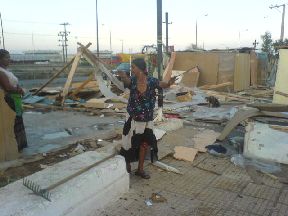 Nigeria, the Philippines and Greece Cited for Severe Human Rights Violations by Housing Rights Group
Nigeria, the Philippines and Greece Cited for Severe Human Rights Violations by Housing Rights GroupNigeria, the Philippines and Greece, have been named as recipients of the
2006 Housing Rights Violator Awards by the Geneva-based Centre on Housing Rights and Evictions (COHRE), for their systematic violation of housing rights and continued failure to abide by their international legal obligations. At the same time, COHRE has presented seven courageous Chinese Human Rights activists with the
2006 Housing Rights Defender Awards.
Each year, COHRE bestows its Housing Rights Violator Awards on three governments or public institutions guilty of particularly serious housing rights violations in the preceding year. COHRE has issued it Violator Awards since 2002.
COHRE’s Executive Director (a.i), Jean du Plessis, said, “Although many governments continue to violate the right to adequate housing, in 2006
Nigeria, the Philippines and Greece stand out for their appalling disregard for this basic human right. The Nigerian Government has forcibly evicted more than two million people from their homes since 2000. Although the Nigerian Constitution affirms that: 'the State shall direct its policy towards ensuring...that suitable and adequate shelter...are provided for all citizens', the Federal Government has consistently neglected its responsibilities and violated its obligations under international law, including the African Charter on Human and Peoples’ Rights. These widespread and ongoing evictions in Nigeria have resulted in the massive displacement of millions of people, with a spiralling effect on health, education, employment and family cohesion.”
“The Government of the
Philippines continues to evict hundreds of thousands of people in the name of ‘beautification’ and ‘development’, with the urban poor being the worst affected. More than 145,000 people (29,000 families) have already been evicted from their homes in Metro Manila and Bulacan province since early 2005 due to the rehabilitation of the Philippines National Railway system, referred to as the 'Northrail-Southrail Linkage Project.’ COHRE’s research reveals that most of the evictees have been moved to relocation sites where living conditions are appalling due to a lack of basic services such as potable water, electricity and sanitation facilities. The unsanitary conditions and an outbreak of dengue fever at the Southville relocation site in Cabuyao have claimed the lives of 12 infants and children this year. Forced evictions and demolitions are also being carried out in preparation for the 12th ASEAN Summit to be hosted by the Philippines next week. The evictions and demolition in Metro Cebu have left more than 3,000 people homeless since September 2006,” he said.
Du Plessis added, “Roma communities in
Greece continue to face pervasive and persistent discrimination in access to housing. A majority of Roma in Greece live in extremely poor conditions - lacking access to basic services such as water and electricity - and frequently face segregation and forced eviction by local authorities. The conditions in which these communities live are dehumanising and constitute a grave human rights violation by the Government of Greece. It is completely unacceptable for a long-standing member of the European Union (EU) to allow such a situation to continue within its borders. What we are facing here is the blatant and deliberate exclusion of a particular group, creating a third world reality within a wealthy European State. The shacks of the Roma in Patras, Athens or Asproprygos are no different from those in slums in Nairobi or Manila. These evictions clearly indicate that the Greek government is not taking its international legal obligations seriously and is turning a blind eye to local governments' systematic abuse of the human rights of Roma in Greece.”
The
Housing Rights Defender Award is presented annually by COHRE to an individual who has shown outstanding commitment to the realisation of housing rights for all people. For the first time since the inception of this award in 2003, it will be presented to a number of housing rights activists rather than a single person. The joint recipients of the
2006 Housing Rights Defender Award are: Fu Xiancai; Ma Yalian; Liu Zhengyou; Huang Weizhong; Chen Xiaoming; Xu Zhengqing; and Zheng Enchong.
Du Plessis, said, “These seven Chinese activists have displayed exemplary commitment, courage and perseverance in their struggles for the land and housing rights of hundreds of farmers, workers and residents in China. They are inspirational examples to every person, community and organisation working for the cause of human rights around the world. The Chinese Government is notoriously oppressive towards human rights activists. Land and housing rights violations including mass forced evictions are common, while legal remedies are scarce for those seeking to assert their rights. The work of these activists, undertaken at grave personal risk to them, their families and fellow activists, has played a catalytic role in bringing to light the unjust practices of the Chinese Government. COHRE is therefore honoured to present the 2006 Housing Rights Defender Award to: Fu Xiancai; Ma Yalian; Liu Zhengyou; Huang Weizhong; Chen Xiaoming; Xu Zhengqing; and Zheng Enchong for their fearless commitment to housing rights in an environment that is hostile to such ideals.”
COHRE’s
Housing Rights Protector Award, presented annually to a government or other public institution demonstrating a truly exceptional commitment to the protection and promotion of housing rights, has not been awarded this year as there is no clear worthy candidate.
Du Plessis said, “Despite the widespread recognition of the human right to adequate housing in international law, violations continue to occur on a massive scale both in the developed and developing worlds. This year, COHRE could not identify a government or public institution that is worthy of recognition for its commitment to the protection and promotion of housing rights. There are good legislative, policy and implementation programmes underway in numerous countries, which do promote the cause of housing rights to some degree, but after careful consideration we came to the conclusion that none of these were sufficiently path-breaking to qualify as a convincing candidate for housing rights protector. The dearth of contenders for the
2006 Housing Rights Protector Award is a clear indicator that more convincing and dramatic examples of housing rights protection are needed to make a sustainable impact in successfully addressing the land and housing rights challenges facing countries today.”
A newly released COHRE report,
Forced Evictions: Violations of Human Rights – Global Survey No. 10, reveals that nearly 2 million people in Africa and over 2.1 million people in Asia and the Pacific have been forcibly evicted from their homes since 2003. Furthermore, nearly 153,000 people in the Americas and over 16,000 people in Europe have been evicted from their homes in the same period.
“The most disturbing aspect of these numbers, is the fact that they are just a sample, based on our research of media reports, and evictions reported to COHRE either by affected persons or by members of our growing global network of partners in the struggle against forced evictions. The total given is merely the tip of the iceberg. The world is, clearly, in the midst of a housing rights and evictions crisis, caused by the fact that governments in both developed and developing countries are not taking their international legal obligations seriously,” said Du Plessis.”
For interviews with Jean du Plessis or additional information please contact COHRE’s Media Officer, Radhika Satkunanathan on +41-22-7341028, +61-400-899474 or media@cohre.org





